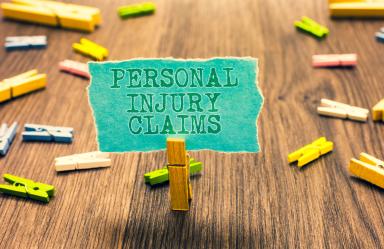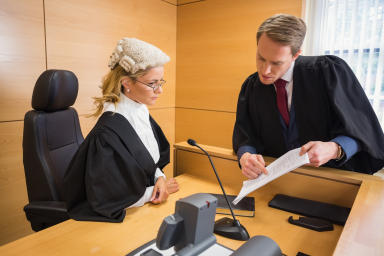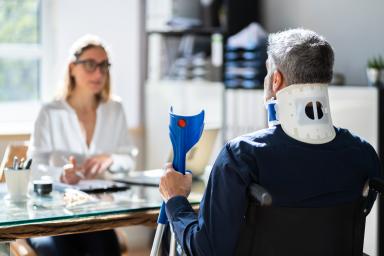How to Fight a Personal Injury Lawsuit

Personal injury lawsuits can be a nightmare for defendants, potentially resulting in significant financial losses and reputational damage. Unfortunately, such cases are not uncommon in the United States, where personal injury lawsuits are filed at a staggering rate. In 2020, personal injury filings increased by 97%, with 45,000 more cases being brought to court, significantly more than the previous year.
The 2023 Paltrow ski trial is one of the most famous personal injury cases. Gwyneth Paltrow was sued for $3.1 million by a man who claimed she had crashed into him while skiing, causing severe injuries. While that case was ruled in favor of the defendant, those results aren’t always common.
If you are facing a personal injury lawsuit, knowing your rights and how to fight back is essential. This article will examine some of the strategies and resources available to defendants in personal injury lawsuits and provide practical tips on how to defend yourself effectively.
How to File an Answer with the Court
As the defendant in a personal injury lawsuit, the first step is carefully reviewing the complaint against you. The complaint will outline the plaintiff's allegations and the damages they are seeking. You must file your answer to the complaint within a specific time, typically 20-30 days depending on the jurisdiction.
To file an answer, you must draft a formal response that admits or denies each allegation made in the complaint. In addition, you can include affirmative defenses or counterclaims in your response. Most importantly, be honest and thorough in your answer, as it will set the tone for the rest of the litigation.
Once you have drafted your answer, you must file it with the court and serve a copy to the plaintiff or their attorney. Depending on the jurisdiction, you may also need to pay a filing fee. After your answer has been filed, the plaintiff can respond with a reply.
It is essential to work closely with your attorney throughout the litigation process and gather any evidence or documentation that may support your defense. This may include witness statements, medical records, or other relevant documents. Ultimately, the goal of the litigation is to reach a fair and equitable resolution for both parties. Depending on the circumstances of the case, this may involve negotiating a settlement or going to trial.
Strategies Used in Answer
When a defendant faces a personal injury lawsuit, their answer to the plaintiff's complaint is a crucial opportunity to defend against the allegations and protect their legal rights. There are several strategies that a defendant may use in their answer to effectively respond to the claims made by the plaintiff, including the following:
Deny the Allegations
The most common strategy defendants use in a personal injury lawsuit is to deny the allegations. Essentially, the defendant is disputing the claims made by the plaintiff and stating that they did not do what they are being accused of.
When the defendant denies the allegations, they are putting the burden of proof on the plaintiff to provide evidence to support their claims. The plaintiff must demonstrate that the defendant's actions or negligence caused the injury and that damages are being sought due to the injury.
However, denying the allegations may not be enough to defend against a personal injury lawsuit successfully. The defendant must also be prepared to provide evidence and testimony to support their defense. This may include witness statements, medical records, or other documentation that can help demonstrate that the plaintiff's claims are unfounded.
Assert Affirmative Defenses
Affirmative defenses are legal arguments that, if proven, could prevent the plaintiff from recovering damages, even if the allegations made in the complaint are true. Some common affirmative defenses include:
Assumption of Risk: This defense asserts that the plaintiff was aware of and voluntarily assumed the risks associated with the activity that caused their injury.
Contributory or Comparative Negligence: This defense argues that the plaintiff's negligence contributed to their injuries and that they should be held partly or wholly responsible for the damages they suffered.
Statute of Limitations: This defense asserts that the plaintiff waited too long to file their lawsuit and that the case should be dismissed.
File a Counterclaim
In addition to responding to the plaintiff’s complaint, a defendant may choose to file a counterclaim against the plaintiff. A counterclaim is a legal action that asserts a claim against the plaintiff arising from the same transaction or occurrence that gave rise to the plaintiff's claim.
The purpose of filing a counterclaim is to shift the focus of the litigation and potentially obtain a more favorable outcome for the defendant. By asserting a counterclaim, the defendant may get damages or other relief from the plaintiff rather than being solely on the defensive.
Personal Injury Lawsuit Defense Costs: What to Expect
Defending against a personal injury lawsuit can be complex and expensive for a defendant. You may face various expenses, from legal fees to expert witness fees to settlement costs. To effectively manage these costs and protect your interests, it's important to clearly understand the potential expenses associated with a personal injury case.
Legal Fees
Legal fees can be one of the highest costs a defendant may incur when defending against a personal injury lawsuit. However, these fees vary widely depending on several factors, including the case's complexity, the attorney's hourly rate, and the time spent working on the case.
In most personal injury cases, attorneys charge on an hourly basis. The hourly rate can vary significantly depending on the attorney's experience, location, and the case's complexity. Some attorneys may charge a flat fee for certain aspects of the case, such as filing the answer or attending a deposition.
It's also important to consider how much time an attorney spends on the case can also impact the legal fees and overall cost. For example, some cases may be resolved relatively quickly, while others require extensive trial preparation.
For these reasons, defendants must discuss legal fees and costs with their attorney early on in the case to clearly understand what to expect. In addition, some attorneys may offer payment plans to help make legal fees more manageable.
Expert Witness Fees
Expert witnesses may be called upon to provide specialized knowledge or opinions to support the defendant's case in a personal injury case. These experts can provide testimony on various topics, from medical treatment to accident reconstruction to the value of lost wages or future medical care. Depending on the type of expert and the amount of time they spend working on the case, these fees can range from a few thousand dollars to tens of thousands or more.
In addition to the fees, defendants may incur costs associated with preparing the expert for their testimony. This can include time spent by the attorney reviewing the expert's report, meeting with the expert to discuss their testimony, and coordinating their appearance at trial.
Court Costs
Court costs can also be a considerable expense for defendants. They may include fees associated with filing documents at the court, such as the answer to the plaintiff's complaint or fees for attending court hearings or depositions.
Court filing fees can vary depending on the jurisdiction and the type of document being filed. For example, the fee to file an answer to a complaint may be different from the fee to file a motion to dismiss. These fees can range from a few hundred to several thousand dollars, depending on the court and the specific case. In addition to filing fees, defendants may also need to pay fees for other court-related services, such as court reporters or transcripts. For example, if a defendant is required to attend a deposition, they may need to pay for the court reporter's services to create a transcript.
Settlement or Judgment Costs
Settlement or judgment costs refer to the amount of money a defendant may be required to pay to settle a personal injury case or to satisfy a judgment if the case goes to trial and the defendant is found liable. These costs can be significant and can include several different components.
First, a defendant may be required to pay damages to the plaintiff as part of a settlement or judgment. Depending on the case’s circumstances, damages can range from thousands to hundreds of thousands of dollars to cover compensation for medical expenses, lost wages, pain and suffering, and other costs associated with the injury.
In addition to the damages, a defendant may be required to pay interest on the damages awarded. This interest rate can vary depending on the jurisdiction and the specific terms of the settlement or judgment.
Attorney's fees and costs can also be a component of settlement or judgment costs. Sometimes, the defendant may be required to pay the plaintiff's attorney's fees and costs.
Example Deposition Questions for Defendants in Personal Injury Cases
During a personal injury case, the defendant may be required to participate in a deposition where they are asked questions under oath by the plaintiff's attorney. This deposition is an integral part of the legal process, as it allows the plaintiff's attorney to gather information about the case and assess the strength of the case.
How Does Bankruptcy Affect Personal Injury Defendants?
When a defendant files for bankruptcy, an automatic stay goes into effect, which stops all collection efforts by creditors, including the plaintiff in a personal injury lawsuit. This means the case is put on hold while the bankruptcy proceedings are underway, and the plaintiff cannot take further action to collect damages from the defendant until the stay is lifted.
In some cases, a defendant may be able to discharge their liability for damages related to a personal injury lawsuit by filing for bankruptcy, meaning that the defendant would be released from any obligation to pay damages to the plaintiff. The plaintiff would not be able to pursue further legal action against the defendant.
However, there are some limitations to this process. For example, in certain situations, such as cases involving intentional torts or DUI accidents, the defendant may be unable to discharge their liability for damages through bankruptcy. Additionally, the bankruptcy court may determine that the defendant has a certain amount of non-exempt assets that can be used to pay some or all of the damages owed to the plaintiff.
Can the Plaintiff Recover the Defendant’s Retirement in a Personal Injury Lawsuit?
In some cases, retirement funds may be considered part of the defendant's assets and, therefore, subject to being included in a judgment against them. However, this may also depend on the type of retirement account and any legal protections afforded to those funds under state or federal law.
Additionally, even if the retirement funds are subject to being included in a judgment, the plaintiff may not be able to recover the total amount. The defendant may be able to claim exemptions or protections that limit the amount that can be collected.
What Happens if the Defendant in a Personal Injury Lawsuit is Deceased?
If the defendant in a personal injury lawsuit is deceased, the suit may still proceed depending on the case's specific circumstances. Generally, the plaintiff can bring a lawsuit against the deceased defendant's estate. In most cases, the executor or administrator of the defendant's estate will be responsible for defending against the lawsuit. They may also be responsible for paying any damages awarded to the plaintiff if the suit is successful.
Legal Resources for Defendants
When you are a defendant in a personal injury lawsuit, navigating the legal system, understanding your rights, and finding the necessary resources can be overwhelming. However, several legal resources are available to help defendants in a personal injury lawsuit, including legal aid organizations, state bar associations, and online legal resources. This list will delve into some of the most valuable legal resources available to defendants, including what they offer and how to access them.
Legal Services Corporation
If you are a defendant in a personal injury lawsuit and need legal assistance, you may be able to find a local legal aid organization that receives funding from the Legal Services Corporation (LSC). The LSC is a nonprofit organization that funds over 130 legal aid organizations nationwide, providing free or low-cost legal assistance to individuals who cannot afford to hire an attorney. These organizations can offer various legal services, including representation in court, legal advice and counseling, and assistance with paperwork and filings.
To find a legal aid organization in your area that receives funding from LSC, you can visit the LSC website and use their online directory.
State Bar Associations
State bar associations are organizations of licensed attorneys that regulate the practice of law and promote the administration of justice in a given state. They can be a valuable resource for defendants involved in a personal injury lawsuit, as many state bar associations offer individuals various legal resources and services.
For example, some state bar associations operate lawyer referral services that can help connect defendants with an attorney who practices personal injury defense. Others may have legal aid programs that provide free or low-cost legal services to individuals who cannot afford an attorney.
You should contact your state bar association directly to learn more about available resources and services.
Pro Bono Net
Pro Bono Net is a nonprofit organization that helps low-income individuals connect with volunteer attorneys to receive pro bono legal services. Some of the services and resources that Pro Bono Net provides include the following:
Legal aid clinics that offer free legal advice and counseling
Lawyer referral services to connect defendants with personal injury attorneys
Pro bono programs to encourage attorneys to provide free legal services
Online legal resources such as articles, guides, and toolkits
To access these services and resources, defendants can visit the Pro Bono Net website and search for legal aid organizations in their area.
Expertise.com StaffAuthor
Step into the world of Expertise.com, your go-to hub for credible insights. We don't take accuracy lightly around here. Our squad of expert reviewers, each a maestro in their field, has given the green light to every single article you'll find. From rigorous fact-checking to meticulous evaluations of service providers, we've got it all covered. So feel free to dive in and explore. The information you'll uncover has been stamped with the seal of approval by our top-notch experts.




